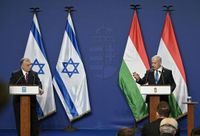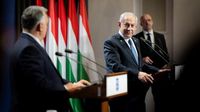In a significant diplomatic move, Israeli Prime Minister Benjamin Netanyahu visited Budapest on April 3, 2025, where he and Hungarian Prime Minister Viktor Orbán held a joint press conference that underscored their shared ideological stance. Netanyahu declared that Israel and Hungary are engaged in a "similar battle" to protect their Judeo-Christian heritage and Western civilization from the threats posed by radical Islam, particularly citing Iran as a "pulsating engine" of this threat.
During the press conference, Netanyahu emphasized, "We will smash the Iranian terror axis, which threatens not only us, but Europe," reinforcing the notion that their alliance is rooted in mutual values and security interests. This partnership has been strengthened over recent years, with Hungary emerging as one of Israel's staunchest allies in Europe.
Netanyahu's visit coincided with Hungary's announcement that it would commence the process of withdrawing from the International Criminal Court (ICC). This decision, applauded by Netanyahu as a "bold and principled" stance, is particularly significant given that he currently faces an ICC arrest warrant over allegations of war crimes related to Israel's military operations in Gaza.
Orbán's government has openly rejected the ICC's authority, labeling the arrest warrant against Netanyahu as "brazen." This rejection of international legal norms aligns with Orbán's broader political strategy, which has often included challenging the European Union's values and policies. Notably, Orbán has previously made controversial statements regarding Hungary's ethnic composition and has been criticized for his government's rhetoric that many deem antisemitic.
The relationship between Netanyahu and Orbán has developed since Netanyahu's landmark visit to Hungary in 2017, which marked the first time an Israeli prime minister had traveled to the country in decades. This visit was not without controversy, as it raised questions about the implications of aligning with a leader known for his divisive and nationalistic policies.
Since that initial visit, Hungary has consistently supported Israel on various fronts, including blocking EU statements critical of Israeli settlements, backing Israel at the United Nations, and even establishing a diplomatic trade office in Jerusalem in 2019. The recent decision to withdraw from the ICC is seen as a continuation of this trend, further solidifying the bond between the two nations.
However, this alliance raises complex questions regarding the broader implications of such a partnership. Critics argue that Netanyahu's close relationship with Orbán, who has been accused of promoting narratives that fuel antisemitism, could undermine Israel's moral authority on the global stage. The Holocaust's legacy, which is central to Israel's identity as the world's only Jewish state, complicates this relationship, especially in light of Orbán's past comments that many find troubling.
As Netanyahu navigates increasing political and legal pressures at home and abroad, the support from Hungary may bolster his claims of having international allies and countering the narrative that Israel is isolated. Yet, this cooperation also invites scrutiny from various quarters, including Jewish communities in Europe and international observers concerned about the implications of such alliances.
In the context of ongoing geopolitical tensions, Netanyahu's visit and the resulting declarations signal a strategic alignment that serves both leaders' interests. For Orbán, supporting Netanyahu provides an opportunity to challenge international institutions he has criticized, while for Netanyahu, it reinforces his position amidst allegations of war crimes and ongoing military operations in Gaza.
Moreover, the timing of this visit comes as Israel faces significant criticism from various international bodies regarding its actions in Gaza, making Hungary's support all the more crucial for Netanyahu. The ICC's scrutiny of Israel's military operations has sparked debates about accountability and international law, and Netanyahu's alliance with Orbán could be interpreted as a strategic maneuver to deflect criticism.
As this diplomatic relationship evolves, it remains to be seen how it will influence Israel's standing in Europe and the broader international community. While Netanyahu's government may view this partnership as a vital lifeline, it also poses ethical questions regarding the values that Israel stands for and the implications of aligning with leaders whose ideologies may conflict with those values.
In summary, Netanyahu's visit to Hungary marks a pivotal moment in Israeli-Hungarian relations, characterized by shared interests in combating perceived threats to their civilizations. Yet, this partnership also invites a broader reflection on the implications of such alliances, particularly in light of Orbán's controversial political history and rhetoric. As both leaders navigate their respective challenges, the symbolic significance of their cooperation will likely resonate far beyond the immediate political landscape.






